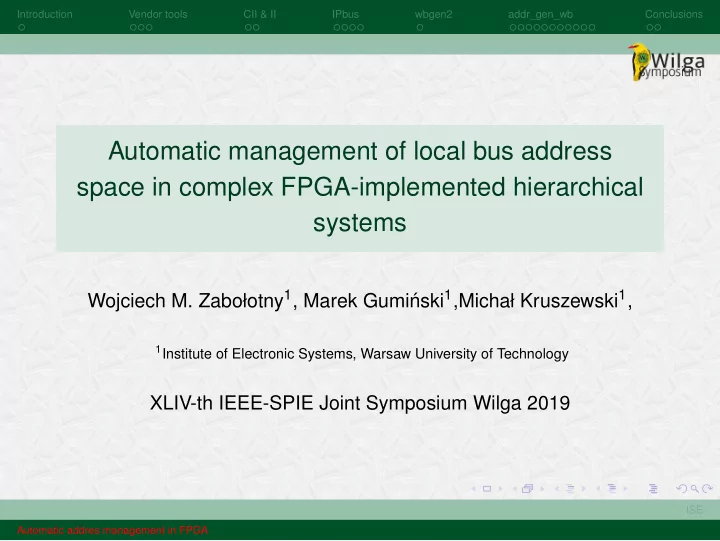

Introduction Vendor tools CII & II IPbus wbgen2 addr_gen_wb Conclusions Automatic management of local bus address space in complex FPGA-implemented hierarchical systems Wojciech M. Zabołotny 1 , Marek Gumi´ nski 1 ,Michał Kruszewski 1 , 1 Institute of Electronic Systems, Warsaw University of Technology XLIV-th IEEE-SPIE Joint Symposium Wilga 2019 ISE Automatic addres management in FPGA
Introduction Vendor tools CII & II IPbus wbgen2 addr_gen_wb Conclusions Introduction The data processing systems are often implemented in FPGA as parameterized, complex, multilevel hierarchical systems Its configuration and diagnostics requires convenient access to the internal blocks via control interface Scalable and flexible implementation of the control interface is particularly important in systems developed by many independent teams, or in subsystems designed for reuse. An example may be firmware components and subsystems developed for CBM experiment. ISE Automatic addres management in FPGA
Introduction Vendor tools CII & II IPbus wbgen2 addr_gen_wb Conclusions Introduction The data processing systems are often implemented in FPGA as parameterized, complex, multilevel hierarchical systems Its configuration and diagnostics requires convenient access to the internal blocks via control interface Scalable and flexible implementation of the control interface is particularly important in systems developed by many independent teams, or in subsystems designed for reuse. An example may be firmware components and subsystems developed for CBM experiment. The key questions in such interfaces are: routing of control interface between blocks creating of address maps (assignment of addresses both for HW and SW) ISE Automatic addres management in FPGA
Introduction Vendor tools CII & II IPbus wbgen2 addr_gen_wb Conclusions Vendor tools - Xilinx - block design ISE Automatic addres management in FPGA
Introduction Vendor tools CII & II IPbus wbgen2 addr_gen_wb Conclusions Vendor tools - Xilinx - address allocation ISE Automatic addres management in FPGA
Introduction Vendor tools CII & II IPbus wbgen2 addr_gen_wb Conclusions Vendor tools - summary Well integrated with GUI Intuitive user interface Automatic assignment of addresses ISE Automatic addres management in FPGA
Introduction Vendor tools CII & II IPbus wbgen2 addr_gen_wb Conclusions Vendor tools - summary Well integrated with GUI Intuitive user interface Automatic assignment of addresses Poor support for parametrized number of blocks ISE Automatic addres management in FPGA
Introduction Vendor tools CII & II IPbus wbgen2 addr_gen_wb Conclusions Internal Interface and Component Internal Interface Source: [1] VME-like interface inside FPGA ISE Automatic addres management in FPGA
Introduction Vendor tools CII & II IPbus wbgen2 addr_gen_wb Conclusions Internal Interface and Component Internal Interface Source: [2] Sophisticated solution resulting in complex FPGA logic, not Open Source ISE Automatic addres management in FPGA
Introduction Vendor tools CII & II IPbus wbgen2 addr_gen_wb Conclusions IPbus addressing scheme <node id="crob" > IPbus is well established standard for <node id="crob_addr_ver" address="0x0" permission="r" /> <node id="sys_ctrl" address="0x200" permission="rw" > Ethernet communication with <node id="febs_mode" mask="0x0000000E" /> </node> FPGA-based systems <node id="link_mask[0]" address="0x201" permission="rw" /> <node id="link_mask[1]" address="0x202" permission="rw" /> It is fully Open Sourced <node id="ic" > <node id="ctrl" address="0x203" permission="rw" > It uses nice XML tables for defining <node id="reset" mask="0x00000001" /> <node id="start_write" mask="0x00000002" /> addresses of slaves <node id="start_read" mask="0x00000004" /> <node id="addr" mask="0x0000FF00" /> There are software libraries for </node> <node id="tx_rega_nbtr" address="0x204" permission="rw" > Python and C++ <node id="reg_addr" mask="0x0000FFFF" /> <node id="bytes_to_read" mask="0xFFFF0000" /> </node> <node id="tx_data" address="0x205" permission="rw" /> <node id="status" address="0x1" permission="r" > <node id="ready" mask="0x00000001" /> <node id="empty" mask="0x00000002" /> <node id="addr" mask="0x0000FF00" /> </node> <node id="rx_mptr_nbw" address="0x2" permission="r" > <node id="mem_ptr" mask="0x0000FFFF" /> <node id="words_read" mask="0xFFFF0000" /> </node> <node id="rx_data" address="0x3" permission="r" /> </node> [...] </node> ISE Automatic addres management in FPGA
Introduction Vendor tools CII & II IPbus wbgen2 addr_gen_wb Conclusions IPbus addressing scheme <node id="crob" > IPbus is well established standard for <node id="crob_addr_ver" address="0x0" permission="r" /> <node id="sys_ctrl" address="0x200" permission="rw" > Ethernet communication with <node id="febs_mode" mask="0x0000000E" /> </node> FPGA-based systems <node id="link_mask[0]" address="0x201" permission="rw" /> <node id="link_mask[1]" address="0x202" permission="rw" /> It is fully Open Sourced <node id="ic" > <node id="ctrl" address="0x203" permission="rw" > It uses nice XML tables for defining <node id="reset" mask="0x00000001" /> <node id="start_write" mask="0x00000002" /> addresses of slaves <node id="start_read" mask="0x00000004" /> <node id="addr" mask="0x0000FF00" /> There are software libraries for </node> <node id="tx_rega_nbtr" address="0x204" permission="rw" > Python and C++ <node id="reg_addr" mask="0x0000FFFF" /> <node id="bytes_to_read" mask="0xFFFF0000" /> Unfortunately, it provides very limited </node> <node id="tx_data" address="0x205" permission="rw" /> support for automatic generation of <node id="status" address="0x1" permission="r" > address tables <node id="ready" mask="0x00000001" /> <node id="empty" mask="0x00000002" /> <node id="addr" mask="0x0000FF00" /> </node> <node id="rx_mptr_nbw" address="0x2" permission="r" > <node id="mem_ptr" mask="0x0000FFFF" /> <node id="words_read" mask="0xFFFF0000" /> </node> <node id="rx_data" address="0x3" permission="r" /> </node> [...] </node> ISE Automatic addres management in FPGA
Introduction Vendor tools CII & II IPbus wbgen2 addr_gen_wb Conclusions IPbus extension - adr_gen To support automatic generation of address maps for IPbus, the “adr_gen” [3] system was created It uses the standard IPbus ipbus_ctrlreg_v block which provides vector of control registers and vector of status registers Similar block may be also generated for AXI bus instead of IPbus The hierarchy of connected blocks and registers is described in Python The registers in connected hierarchy of blocks are assigned consecutive addresses (that may result in inefficient decoding) The addresses are generated in VHDL package, in IPbus XML and in Python module ISE Automatic addres management in FPGA
Recommend
More recommend